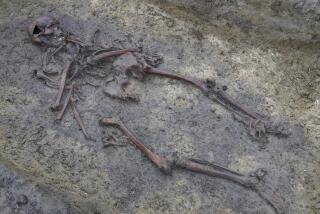Developments in Brief : Evidence of Human Sacrifice Found in Diggings at Early English Burial Sites
- Share via
English archeologists have found new evidence of human sacrifice, including the remains of an Anglo-Saxon plowman buried with his plow, possibly in a ritual to persuade pagan gods to bestow a good harvest.
Nine burials in eastern England dating from the late 6th and early 7th centuries were of people in strange positions, most of whom appeared to have met a violent end, the archeologists said in London. The period of the burials is about 400 years before William the Conqueror invaded England in 1066.
Found in Sutton Hoo in Suffolk, the plowman was buried with his legs splayed. Two other victims were buried face-down with their wrists tied behind their backs. And two others were in their graves in kneeling positions--one with the top of his head cut off. Another victim had a broken neck, and another’s wrists were tied above the head.
In 1939, an early 7th-Century king was found entombed in a warship at Sutton Hoo, a village seven miles northeast of Ipswich. The British Museum has jewelry, armor and weapons from his tomb and about 500 graves have still to be excavated.
Another example of human sacrifice was found 160 miles to the north, at Sewerby near Bridlington. There, archeologists uncovered the remains of an old woman buried alive on top of a younger woman in what appeared to have been a ritual execution.
More to Read
Sign up for Essential California
The most important California stories and recommendations in your inbox every morning.
You may occasionally receive promotional content from the Los Angeles Times.









